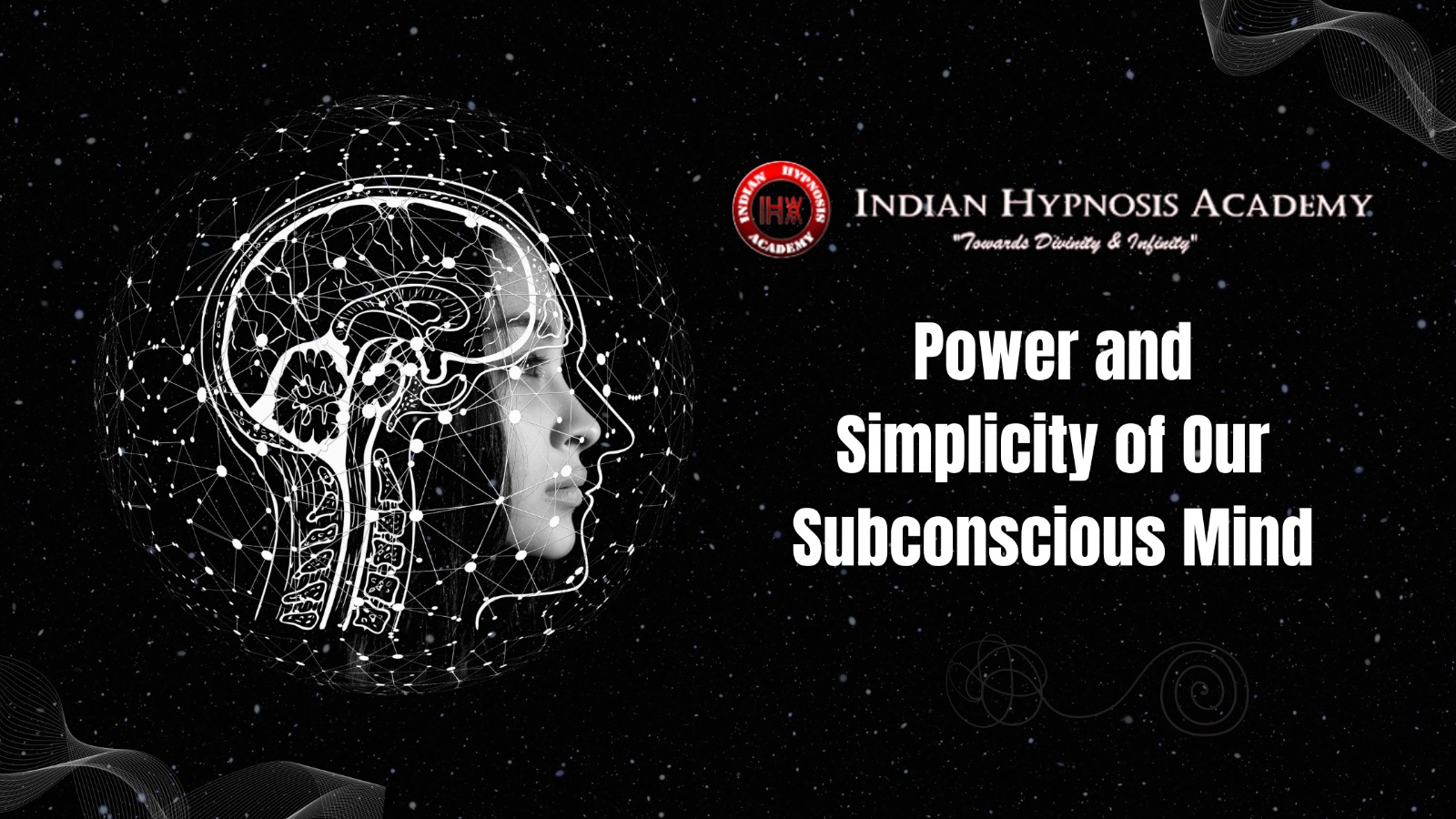The human mind is a complex machine that works in ways we have yet to fully understand. Within our minds, there are two main components – the conscious and subconscious. The conscious mind is responsible for our thoughts, feelings, and actions that we are aware of, while the subconscious mind controls all the things we are not consciously aware of. The subconscious mind is a powerful and often overlooked aspect of our being that can greatly impact our lives. In this article, we will explore the power and simplicity of our subconscious mind.
Beliefs
Our subconscious mind is responsible for many of our behaviors and reactions. It is where our beliefs, habits, and automatic responses are stored. Our beliefs shape our perception of the world and our place in it. Negative beliefs can create limiting beliefs that can hold us back from achieving our goals and dreams. However, by changing our beliefs, we can change our lives for the better.
Visualization
One powerful way to change our beliefs is through the use of visualization. Visualization is the process of creating mental images of what we want to achieve or experience. By visualizing positive outcomes, we can reprogram our subconscious mind to believe that these outcomes are possible. For example, if we want to start a business, we might visualize ourselves succeeding in our venture, attracting new clients, and achieving financial success.
Habits
Our habits are another important aspect of our subconscious mind. Habits are automatic responses that we have learned over time. They are firmly established in our subconscious mind and may present a challenge to overcome. However, by understanding how our subconscious mind works, we can change our habits and create new ones.
One technique for changing habits is to use a habit tracker. A habit tracker is a simple tool that allows us to keep track of our progress towards a new habit. By tracking our progress, we can see how far we’ve come and stay motivated to continue. For example, if we want to start exercising regularly, we might use a habit tracker to record our workouts and celebrate each milestone we reach.
Emotions
The power of our subconscious mind can also be seen in our emotions. Emotions are a natural part of the human experience and are often controlled by our subconscious mind. By understanding our emotions and how they are influenced by our subconscious mind, we can learn to control them and improve our emotional well-being.
Expressing gratitude
One technique for improving emotional well-being is to practice gratitude. Expressing gratitude involves concentrating on the positive aspects of our lives and feeling appreciative towards them. By cultivating a sense of gratitude, we can reprogram our subconscious mind to focus on positive emotions and experiences. For example, we might start a gratitude journal and write down three things we’re grateful for each day.
Meditation
Another powerful tool for improving emotional well-being is meditation. Meditation is a technique used to soothe the mind and concentrate on the current moment. By practicing meditation regularly, we can reprogram your subconscious mind to be more calm and centered. Meditation has been shown to reduce stress, anxiety, and depression and improve overall well-being.
Despite the power of our subconscious mind, it is also surprisingly simple. Our subconscious mind is not capable of complex thought like our conscious mind. It operates on a much simpler level and is driven by basic instincts and emotions. However, this simplicity is what makes it so powerful. By focusing on simple thoughts and beliefs, we can change our subconscious mind and create positive change in our lives.
Positive self-talk
One simple technique for changing our subconscious mind is to use positive self-talk. Positive self-talk is the practice of speaking to ourselves in a positive and encouraging way. By using positive self-talk, we can reprogram our subconscious mind to believe in our own abilities and potential. For example, instead of saying “I can’t do this,” we might say “I am capable of handling this challenge.”
Affirmations
Another simple technique for changing our subconscious mind is to use affirmations. Affirmations are positive statements that we repeat to ourselves to create a positive belief system. By repeating affirmations daily, we can reprogram our subconscious mind to believe in our own worth and value. For example, we might repeat affirmations such as “I am worthy,” “I am enough,” or “I am confident.”
Our subconscious mind is also influenced by the people we surround ourselves with. The people we spend time with can have a profound impact on our beliefs, habits, and emotions. By surrounding ourselves with positive, supportive people, we can create a more positive and healthy subconscious mind.
However, it’s important to note that our subconscious mind is not always positive or helpful. It can also be influenced by negative experiences, trauma, and conditioning. When this happens, it can create negative beliefs, habits, and emotions that hold us back in life. In these cases, it’s important to seek out professional help, such as therapy or counseling, to work through these issues and reprogram our subconscious mind in a positive way.
Conclusion
In conclusion, our subconscious mind is a powerful and often overlooked aspect of our being. It controls many of our behaviors, beliefs, and emotions, and can greatly impact our lives. By understanding how our subconscious mind works, we can harness its power and create positive change in our lives. The simplicity of our subconscious mind is what makes it so powerful, and by focusing on simple thoughts and beliefs, we can create a happier, more fulfilling life.
Frequently Asked Questions (FAQs)
1. Explain what the subconscious mind is and how it operates?
The subconscious mind is a component of our mind that functions underneath the threshold of our conscious perception. It is responsible for many of our automatic behaviors and reactions, as well as our beliefs and habits.
2. How does our subconscious mind affect our behavior and decision-making?
Our subconscious mind can have a profound impact on our behavior and decision-making. It is responsible for many of our automatic responses, such as habits and emotional reactions, and can influence our beliefs and values.
3. Can we control our subconscious mind, and if so, how?
While we may not be able to directly control our subconscious mind, we can influence it through techniques such as positive self-talk, visualization, and meditation.
4. What is the relationship between our conscious and subconscious mind?
Our conscious mind is responsible for our awareness and rational thinking, while our subconscious mind is responsible for many of our automatic processes and behaviors.
5. Can we change our beliefs and habits using our subconscious mind?
Yes, we can reprogram our subconscious mind to believe in positive outcomes and to adopt new habits that align with our goals and values.
6. How can visualization help us reprogram our subconscious mind?
Visualization is the process of creating mental images of what we want to achieve or experience. By regularly visualizing positive outcomes, we can reprogram our subconscious mind to believe in our own abilities and potential.
7. What role do our emotions play in our subconscious mind?
Our emotions are often controlled by our subconscious mind, and can influence our beliefs, values, and decision-making.
8. Can meditation help us reprogram our subconscious mind, and if so, how?
Meditation can help us reprogram our subconscious mind by calming our mind and reducing stress and anxiety. By practicing mindfulness, we can become more aware of our thoughts and beliefs, and begin to reprogram them in a positive way.
9. How can we use positive self-talk to reprogram our subconscious mind?
Positive self-talk involves replacing negative thoughts and beliefs with positive affirmations. By regularly repeating positive affirmations, we can reprogram our subconscious mind to believe in our own abilities and potential.
10. What is the benefit of practicing gratitude for our subconscious mind?
Practicing gratitude can help us reprogram our subconscious mind to focus on positive thoughts and experiences. By regularly expressing gratitude, we can begin to shift our perspective towards positivity and abundance.
11. Can we reprogram our subconscious mind to overcome limiting beliefs and fears?
Yes, by regularly practicing positive self-talk, visualization, and other techniques, we can begin to reprogram your subconscious mind to believe in our own worth and potential, and overcome limiting beliefs and fears.
12. How can we use habit trackers to reprogram your subconscious mind?
Habit trackers can help us track our progress towards a new habit or goal, and stay motivated by celebrating each milestone we reach. By consistently tracking our progress, we can reprogram your subconscious mind to adopt new habits that align with our goals and values.
13. Can we reprogram our subconscious mind to adopt healthier habits?
Yes, by consistently practicing positive self-talk, visualization, and other techniques, we can reprogram your subconscious mind to adopt healthier habits that align with our goals and values.
14. How can we overcome negative experiences and conditioning that impact our subconscious mind?
Professional help, such as therapy or counseling, can be helpful in working through negative experiences and conditioning that impact our subconscious mind. By reprogramming our beliefs and habits in a positive way, we can begin to heal from past traumas and move forward in a positive direction.
15. Can the people we surround ourselves with affect our subconscious mind?
Yes, The people we surround ourselves with can have a profound impact on our subconscious mind. If we consistently spend time with people who are negative or who have limiting beliefs, it can be difficult to reprogram our own subconscious mind in a positive way.
16. What is the role of the subconscious mind in achieving success?
The subconscious mind plays a critical role in achieving success, as it is responsible for many of our automatic thoughts and behaviors. By reprogramming our subconscious mind to believe in our own worth and potential, we can begin to take more positive and confident actions towards our goals.
17. Can we reprogram our subconscious mind to improve our relationships?
Yes, by working on our beliefs and habits related to relationships, we can reprogram our subconscious mind to attract more positive and fulfilling relationships into our lives.
18. How can we use affirmations to reprogram our subconscious mind?
Affirmations are a powerful tool for reprogramming the subconscious mind. By regularly repeating positive affirmations, we can begin to shift our beliefs and habits in a more positive direction.
19. Can hypnotherapy be used to reprogram the subconscious mind?
Yes, hypnotherapy is a technique that can be used to access the subconscious mind and reprogram it in a positive way.
20. How long does it take to reprogram the subconscious mind?
The length of time it takes to reprogram the subconscious mind can vary depending on the individual and the specific beliefs and habits they are working to change. However, with consistent practice and dedication, it is possible to see positive changes in a matter of weeks or months.
References
- https://www.briantracy.com/blog/personal-success/understanding-your-subconscious-mind/
- https://www.bethkendall.com/blog/why-the-subconscious-mind-is-ridiculously-powerful
- https://ignitesales.com/blog/95-of-purchasing-decisions-are-emotional/#:~:text=The%20biggest%20subconscious%20urge%20is,we%20are%20driven%20by%20feelings.
- https://www.poughkeepsiejournal.com/story/life/wellness/living-being/2016/06/24/living-hypnosis/85838078/
- https://www.quora.com/What-is-the-relationship-between-the-conscious-and-subconscious-mind-How-does-the-conscious-mind-influence-the-subconscious



